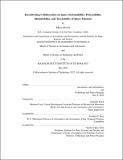Incentivizing Collaboration on Space Sustainability: Detectability, Identifiability, and Trackability of Space Missions
Author(s)
Slavin, Maya
DownloadThesis PDF (2.081Mb)
Advisor
Wood, Danielle
Terms of use
Metadata
Show full item recordAbstract
The world has increasingly come to rely on satellites to provide services such as navigation, global communications, banking, national security, and weather forecasting. However, as satellites are launched into space at increasing rates, the risk of collision between active payloads or with pieces of debris rises exponentially. One of the initiatives to combat congestion is the Space Sustainability Rating. The Space Sustainability Rating is a rating system commissioned by the World Economic Forum in 2018 that scores a space mission on how sustainable it is for the long-term usability of the space environment, particularly in regards to debris mitigation and collision avoidance. It aims to incentivize more responsible design decisions by satellite operators and encourage the acceleration and establishment of sustainable norms of behavior. One of the six scoring modules in the Space Sustainability Rating is the Detectability, Identifiability, and Trackability (DIT) module. This thesis builds on the earlier work that was done to develop the first version of the DIT module and makes three primary contributions to it. First, it investigates using the previously proposed concept of orbital zip codes for the Identifiability scoring process and then suggests an alternative scoring methodology based on constructing Cypher queries that count the number of similar space objects that could make identifying a given object more difficult. Second, this thesis demonstrates how ASTRIAGraph, a knowledge-graph database that combines data from multiple space data sources, can be used to facilitate parts of the DIT analysis. Finally, it conducts a multi-case study to examine how missions from regions outside of the United States and Europe score in the DIT module and whether there are factors related to the national contexts in which they were developed that impact their scores.
Date issued
2022-05Department
Massachusetts Institute of Technology. Institute for Data, Systems, and Society; Massachusetts Institute of Technology. Department of Aeronautics and AstronauticsPublisher
Massachusetts Institute of Technology